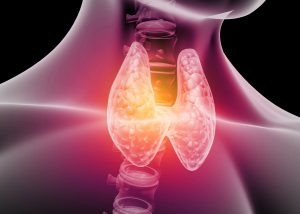 You might not consider your thyroid when you think about heart health, but the small gland may have a significant impact on your cardiovascular health.
You might not consider your thyroid when you think about heart health, but the small gland may have a significant impact on your cardiovascular health.
Your thyroid gland, located at the base of the neck, releases hormones that regulate metabolism. These hormones and their effect on metabolism impact every organ in your body, including your heart.
Advertisement
Both an underactive thyroid (hypothyroid) and overactive thyroid (hyperthyroidism) can have cardiac consequences. And they aren’t immediately noticeable, either. The effects creep up, occur gradually, and usually aren’t recognized for some time.
Hyperthyroidism can lead to irregular heartbeats and blood clots, in addition to a higher risk for stroke, heart failure, and other non-heart-related conditions.
Hypothyroidism, when the gland doesn’t produce enough thyroid hormone, is more common. It can lead to a slower heart rate, constricted blood vessels, higher blood pressure, fluid retention, and increased cholesterol.
According to the American Thyroid Association, about 1 in 8 people in the United States will develop a thyroid condition at some point in their lives, and an estimated 20 million are living with one right now. Women are far more likely to develop a thyroid issue than men are, and roughly half will be unaware of their condition.
Both hypo and hyperthyroidism are treatable, yet they are only detectable through blood tests. Because of the links to heart health, people with high blood pressure, irregular heartbeats, high cholesterol, and other heart issues should undergo routine thyroid checks.
Advertisement
Being aware of, and paying attention to symptoms can be helpful. People with hypothyroidism may experience unexplained weight gain, intolerance to cold temperatures, joint and muscle pain, constipation, and dry, brittle hair.
Hyperthyroidism symptoms include weight loss even with an increased appetite, rapid or irregular heartbeat, nervousness or irritability, muscle weakness, and heat intolerance.
Paying attention to these symptoms may help you determine if you should seek a thyroid hormone test and potentially protect your heart and cardiovascular system from danger.
